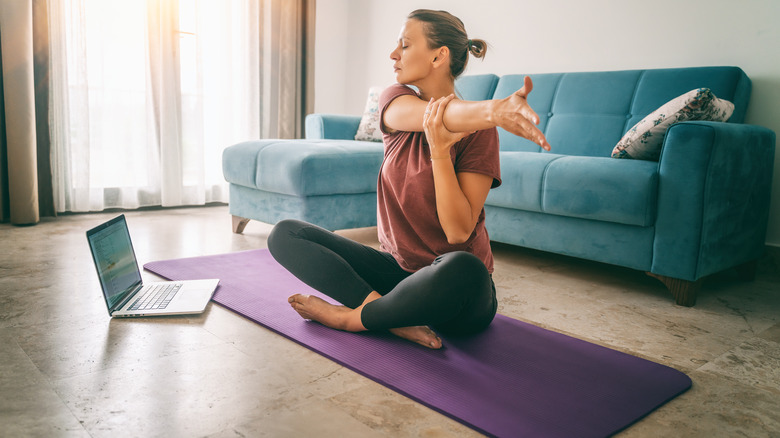Simple Habits That Will Boost Your Energy, According To Health Experts
As the days get shorter in many parts of the world, it's not uncommon to experience a dip in energy. In fact, approximately 10-20% of people experience some form of Seasonal Affective Disorder (SAD) each winter (via American Family Physician). Ultimately, a lack of sun exposure in the colder months can lead to a vitamin D deficiency, according to Nebraska Medicine. Symptoms include general fatigue, insomnia, and a loss of appetite, all of which can make it almost impossible to get up from the couch.
Something like burnout, too — whether with regard to your job or your social life — can also deplete energy. As psychologist Adam Borland, PsyD, acknowledged, "We're living in an incredibly stressful time, and burnout is incredibly prevalent." He added, "I am seeing a lot of people who are very tired. Physically, emotionally tired," (via Cleveland Clinic). If you have trouble balancing the demands of your personal life with your career, you might be particularly susceptible to this kind of exhaustion.
"With many people I work with, there's this question of, 'What's the point? The work that I'm doing, is it really making a difference? Do I even really enjoy what I'm doing anymore?'" Dr. Borland explained. If this describes you, you're fortunately not alone. According to experts, changing up your pre-existing habits — or even adding a few new ones into the mix — can help boost energy whether your fatigue is caused by changing seasons, job frustrations, or a combination of both.
Make a habit of staying hydrated throughout the day
Although coffee can be a helpful tool in moderation (and Starbucks' best seasonal drinks are always tempting), it can sometimes have the opposite of its desired effect. As Dr. Alfred Tallia warned HuffPost, "If you're consuming large amounts of caffeinated beverages throughout the day, it is probably going to affect your sleep pattern. This can then affect your energy levels." In order to reset your sleep schedule, cut back on caffeine, especially in the afternoon.
It's also important to be aware that coffee is dehydrating, meaning that you'll need to drink more water throughout the day in order to offset its negative effects. One symptom of dehydration is fatigue; so, in order to increase your energy levels, make a habit of consuming the recommended 11.5 cups of water a day, per the Mayo Clinic. Likewise, food is an important source of energy too. If you're noticing changes in your motivation or you're struggling to get out of bed in the morning, it could have something to do with forgetting or skipping meals.
Certain foods — sugary cereals and white bread, for instance — are digested so fast that they do little to provide long-term energy. Alternatively, WebMD recommends eating complex carbohydrates like oatmeal, protein-rich foods such as eggs and beans, and getting your omega-3s in the form of nuts. Eating nutrient-rich foods regularly throughout the day can do wonders for your energy levels.
Find the time to regularly move your body too
The number one piece of advice that Dr. Nina Vasan, chief medical officer at mental wellness app Real, gives to patients struggling with low energy is simple: move around more. As she explained to HuffPost, "Even low-impact movement is shown to increase your oxygen flow and hormone levels, which give you a boost of energy." Exercise doesn't have to involve a long run or a trip to the gym, either. It could be something as simple as a quick walk during your lunch break.
Because stress can severely deplete energy, Harvard Health Publishing also recommends activities like yoga or meditation to keep your anxiety in check. Planning regular walks or coffee chats with a trusted friend can also be a beneficial addition to your weekly routine. Curating healthy interpersonal relationships can do wonders for your energy, too. Though it may seem obvious, it's also important to maintain a regular sleep schedule.
Develop a relaxing nighttime routine; dim the lights, listen to a calming podcast or music, read a book — whatever helps you calm down after an active day. You should also steer clear of the blue lights from your various screens in the run-up to bedtime. As Dr. Vasan warned HuffPost, "Spending too much time on your phone, computer, or watching your TV can cause fatigue by disrupting the neurotransmitters that are essential for sleep and restoration." But, if you're seriously concerned about your energy levels, consider speaking with a therapist.


